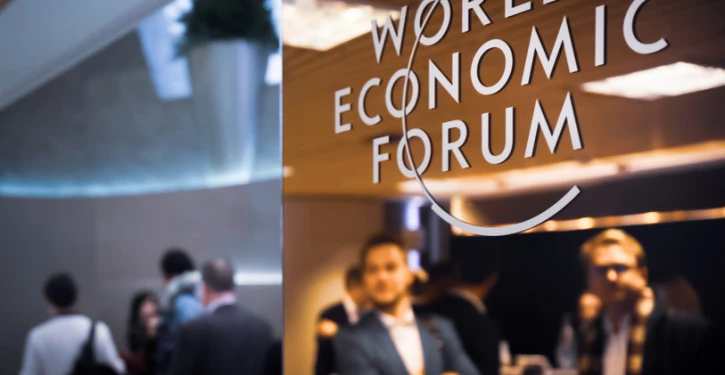The world's most powerful men and women have gathered in Davos, Switzerland to take part in the World Economic Forum. The various forums are mainly about the Russian invasion, inflation and taxes. But Bitcoin and cryptocurrency are not neglected either.
The WEF is an annual, international gathering of around two thousand politicians, representatives of business and international organizations, academics, civil society organizations and journalists.
Cryptocurrency dominates Boardwalk
According to the Reuters news agency, crypto companies dominate the Davos Promenade. This is a street near the convention center for dining and shopping. During the annual WEF, the promenade is traditionally taken over by banks and other big financial players.
This year it's the turn of the future. Apparently, a lot of money was made during the bull market in the crypto sector, as many companies can afford to appear on the Davos Promenade. The aim is, of course, to convince politicians and business leaders of their project.
"A big move for the crypto industry because they've always been against Davos," an industry official told CNBC. This is especially true for bitcoiners, as bitcoin was developed in response to the failure of a centralized world of money. With all the powerful in Davos, the WEF just sends out that they support a central power. Bitcoin is not represented by anyone, but is discussed often enough by participants at the WEF and on the Davos Promenade.
Pizza and NFTs
For example, the company Tether (known for the stablecoin USDT) distributed free pizzas on the Davos Promenade last Sunday. This was done in honor of Bitcoin Pizza Day.
RollApp, which sells NFTs, has set up an NFT shop on Main Street to promote the digital collectibles. Speaking to Reuters and CNBC, participants say the crypto sector has taken over 50-60 percent of Davos Promenade shops and bars.
But cryptocurrency doesn't just play a role on the boardwalk, it starts upon arrival. WEF attendees were bombarded with signs advertising stablecoin issuer Circle and crypto broker Bitcoin Suisse as they stepped off their plane in Zurich or off the train in Davos.
But crypto was also discussed during the WEF. Jeremy Allaire, chairman and CEO of Circle Pay, and Brad Garlinghouse, CEO of Ripple, sat side by side to talk about remittances and digital money during a briefing on Monday. According to Allaire, the world is moving towards a situation where the concept of a cross-border payment sounds just as crazy as the concept of a cross-border email.
Ray Dalio talks about Bitcoin
Billionaire and hedge fund manager Ray Dalio is also in Davos. He spoke about it on the American news channel CNBC and discussed various topics.
He was pessimistic about the US economy and Federal Reserve policy:
“The Federal Reserve will sell, individuals will sell, foreigners will sell, and the United States government will sell because it needs to fund its deficit. There will be a supply/demand problem, which will lead to a bottleneck.”
Cash is garbage
Dalio said cash is still garbage. "Of course, cash is still junk, " Dalio said. "Do you know how quickly you lose purchasing power to cash?"
“When I say cash is a waste,” Dalio clarified, “I mean all currencies relative to the euro, relative to the yen. All of these currencies, like those of the 1930s, will depreciate relative to goods and services.” At the same time, he calls cryptocurrency digital gold.
Bitcoin is digital gold
" Cryptocurrencies in particular, I think blockchain is great ," Dalio said. " But let's call it digital gold. I think digital gold, which would be a kind of bitcoin, is something that probably in the interest of diversification, to find an alternative to gold, has a small place against gold and then against other assets .”
By this small square he means the portfolios of investors. Coming out of Ray Dalio's mouth is telling. To clarify who he is: In 1975 he founded his Bridgewater fund. Today, Bridgewater is the world's largest hedge fund with capital of approximately $150 billion. Since its inception, the fund has paid out $52.2 billion to investors, more than any other hedge fund in the world.
New insights
Still, you can't (yet) compare Dalio to Michael Saylor. Dalio isn't shouting from the rooftops that Bitcoin is the best invention since sliced bread. However, it is worth noting that his opinion on Bitcoin has changed significantly since Davos 2020. He said at the time that bitcoin wasn't money because it didn't function as a store of value or a medium of exchange. Dalio now holds Bitcoin in his personal portfolio.
Prime Minister Rutte takes part in the World Economic Forum (WEF) for two days. Finance Minister Kaag, Defense Minister Ollongren, Social Affairs and Employment Minister Van Gennip, Foreign Trade and Development Minister Schreinemacher and Infrastructure and Water Management State Secretary Heijnen are also traveling to Davos.
My Top PicksHoneygain - Passive earner that pays in BTC or PayPalMandalaExchange -The Best no KYC crypto Exchange!
BetFury - Play And Earn BFG for daily Bitcoin and ETH dividends!
Pipeflare - Faucet that pays in ZCash and Matic, Games pay in DAIWomplay - Mobile dApp gaming platform that rewards in EOS and BitcoinCointiply - The #1 Crypto Earning SiteLiteCoinPay -The #1 FaucetPay earner for LitecoinLBRY/Odysee - YouTube Alternative that lets you earn Money by viewing videos!FaucetPay - The #1 Microwallet PlatformFREEBTC - The #1 FaucetPay earner for Satoshi'sFaucetCrypto - An earning/faucet site that pays out instantlyFireFaucet - An earning site that pays better for some than Cointiply
DogeFaucet - Dogecoin Faucet
xFaucet - BTC, ETH, LTC, Doge, Dash, Tron, DGB, BCH, BNB, ZEC, FEY - Claim every 5 minutes
Konstantinova - BTC, ETH, LTC, Doge, Dash, Tron, DGB, BNB, ZEC, USDT, FEY, 25 Claims Daily


Comments
Post a Comment